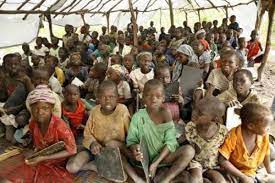Food prices hamper fight against power cuts and shortages of food and fuel
By Jeph Ajobaju, Chief Copy Editor
Rising food prices is a hindrance to the fight in Nigeria to raise living standards above the poverty line in a country where more than half the 206 million population live on less than one dollar a day.
Nigeria’s food inflation rose to 2.0 per cent in April from 1.62 per cent in January, according to the National Bureau of Statistics (NBS).
The World Bank gave the warning in a new report titled, “Global Economic Prospects”, which noted that the soaring prices of goods and services are partly induced by supply disruptions caused by the Russian war in Ukraine.
The report also stressed that the pandemic induced losses in per capital income because it weakened economic growth in Nigeria and other countries in Sub Saharan Africa (SSA).
It projected that this could reverse recent progress in poverty alleviation in countries where vulnerable populations are sizeable, like Nigeria and the Democratic Republic of Congo (DRC).
“Following a rebound of 4.2 percent in 2021, growth in Sub-Saharan Africa (SSA) has weakened this year as domestic price pressures, partly induced by supply disruptions owing to the war in Ukraine, are reducing food affordability and real incomes, especially in low-income countries (LICs),” the World Bank said.
_________________________________________________________________
Related articles:
World Bank officials skeptical of Abuja’s poverty fight
World Bank says 82.4m Nigerians now deeper in poverty
$30b World Bank food project to benefit Nigeria, others
__________________________________________________________________
Growth in SSA economies
“Growth in the three largest SSA economies – Angola, Nigeria, and South Africa – was an estimated 3.8 percent in 2021 supported by the 4.9 percent rebound in South Africa.
“Growth momentum carried on in Angola and Nigeria, where high oil prices, the stabilization of oil production, and recovery in non-resource sectors supported activity in the first half of this year,” the report added, per Vanguard.
“Nevertheless, persistently high domestic inflation, power cuts, and shortages of food and fuel have been weighing on recoveries.
“The growth slowdown in SSA could also intensify pandemic-induced losses in per capita incomes.
“The region is now expected to remain the only Emerging Market and Developing Economy (EMDE) region where per capita incomes will not return to their 2019 levels even in 2023.
“In about 45 percent of the region’s economies and in half of its fragile and conflict-affected countries, per capita incomes are forecast to remain below pre-pandemic levels next year.
“Surging food and fuel import bills could also reverse recent progress in poverty alleviation across the region, especially in countries where vulnerable populations are sizable (Democratic Republic of Congo, Nigeria), and dependence on imported food is high (Benin, Comoros, The Gambia, Mozambique).”













